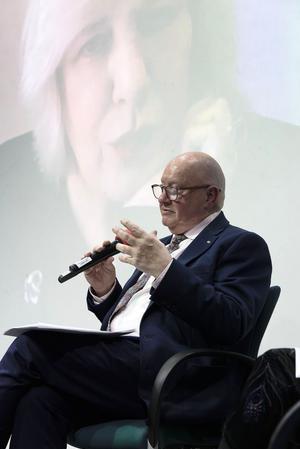Humanitarian law must be respected, with journalists covering conflict afforded protections
Séamus Dooley, NUJ assistant general secretary, has called on the United Nations to vigorously defend the rights of journalists covering the Israel-Palestine conflict with full protection of the Geneva Convention.
Speaking at the event organised by Belfast and district NUJ branch marking the eve of International Day to end impunity for Crimes Against Journalists (2 November) Séamus Dooley echoed the concerns of the International Federation of Journalists over the Israeli government’s statement that journalists in Gaza could not be guaranteed protection, was contrary to international law.
He told guests gathered for the Lyra McKee Memorial Lecture that “the nightmare unfolding in Gaza is an affront to the principles of international law” and said the NUJ joined with those who seek an end to the inhumane treatment of all civilians and for respect or the fundamental principles of the Geneva Conventions and Protocols.

Séamus Dooley
© Kevin Cooper
Dooley said:
“The horrendous attack launched by Hamas and its allies on 7 October targeted civilians and in some cases, subjected them to acts of grotesque violence. In condemning the actions of Hamas, the NUJ has condemned the actions of Israel in targeting densely populated areas, the destruction of residential buildings, the killing of civilians and the displacement of thousands of families.
“If global solidarity means anything it means defending the core values which underpin international law. I am deeply conscious of the pain and suffering of so many families, men, women, and children wiped out as collateral damage in a conflict not of their making.
“In seeking to highlight the need to protect journalists I am in no way minimising the suffering of those trapped in the siege of Gaza or those who suffered at the hands of Hamas: all human beings share the same colour blood regardless of race, religion, ethnic origin, or profession.”
He added:
“The focus on the campaign to end impunity for crimes against journalists is deeply rooted in international humanitarian law, the laws designed to the barbarity of war.
“Article 79 of the Geneva Convention states that: ‘Journalists in war zones must be treated as civilians and protected as such, provided they play no part in the hostilities.’ In international law media facilities are civilian objects and as such enjoy general protection. The prohibition on attacking civilian objects has been firmly established in international humanitarian law since the beginning of the twentieth century and was reaffirmed protocol of the International Criminal Court.
“In this context it was deeply disturbing to read Israel’s announcement on Friday that they could not guarantee the safety of journalists in the Gaza Strip.
“In a statement sent to Reuters and AFP, the Israeli military announced that it could not guarantee the safety of journalists in Gaza. The NUJ shares the concern of the International Federation of Journalists and the Palestinian Journalists' Syndicate (PJS) at this attempt to abdicate responsibility on all belligerents to protect civilians, in particular journalists.
“It is vital that independent journalists are facilitated in covering the war and that the UN seeks to enforce that right. The targeting of journalists or media facilities is a war crime and should be treated as such.”
The assistant general secretary said that, as of October 31, 30 journalists had been killed in the current conflict in the Israeli-Palestinian conflict. 25 Palestinians, four Israelis, and one Lebanese. Every one of them was killed because, like Lyra McKee, they were doing their job. That job involves challenging, asking awkward questions but above all else listening and looking, seeking the stories behind the story.
Recalling a vigil in Dublin marking the killing of Lyra McKee, Dooley quotes from a song written by Irish song writer Paul Brady sung by Noel O’Grady at that event.
“They say the skies of Lebanon are burning,
Those mighty cedars bleeding in the heat
They’re showing pictures on the television,
Women and children dying in the streets,
And we’re still at it in our own place,
Still trying to reach the future through the past,
Still trying to carve tomorrow from a tombstone.”
Natasha Hirst, NUJ president, addresses attendees at the 2023 Lyra McKee inaugural lecture.
